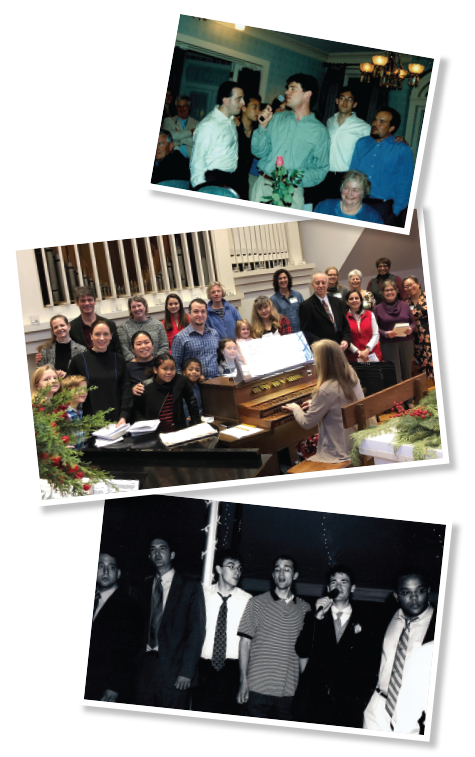Every Christmas Eve, Angus Worthing, MD, FACP, FACR, his wife, Margaret, and two young children, engage in a sing-off over the phone, competing against a professional quartet comprising his best friend, Doug, Doug’s sister and their parents.
Dr. Worthing, a partner at Arthritis & Rheumatism Associates in Washington, D.C., demonstrated his musical talent as a young child. Although he took piano lessons for five years, he never had a voice coach or took a voice lesson. Singing seemed to be as natural to him as talking. He was so good at it that he joined a high school choir and performed with his college choir around the country and world.
“Singing is something that everybody can be good at, whether they think so or not,” says Dr. Worthing. “Don’t discount how great it can make you feel, whether you sing for yourself in the shower, with friends, or other people.”
Medical Training
In 2003, Dr. Worthing graduated from the University of Minnesota Medical School, Minneapolis. Three years later, he completed his internal medicine residency, which was followed by his rheumatology fellowship in 2008, both from Georgetown University Hospital (now called MedStar Georgetown University Hospital), Washington, D.C. In 2008, he joined his current rheumatology practice. Then in 2010, he became a partner and joined the faculty at Georgetown University Medical Center as clinical assistant professor of medicine.
Before joining the ACR’s board of directors this year, Dr. Worthing served on numerous ACR committees. Over the past five years, he has chaired the Government Affairs Committee, currently co-chairs the Governance Task Force and has lectured at ACR/ARP annual meetings and other events.
1st Leadership Role

Top: Dr. Worthing, singing at his wedding rehearsal dinner in 2002, with fellow alumni of the Princeton Nassoons. His mother-in-law-to-be is seated in front of the group.
Middle: This is the “Angus Worthing Family Choir” at St. Patrick’s Episcopal Church in Washington, D.C., 2020. Dr. Worthing is in the back row, second from left. His wife, Margaret Taylor, is to his left.
Bottom: Dr. Worthing, with fellow alumni of the Princeton Nassoons, singing to his bride at his wedding in 2002.
While growing up in Minneapolis, Dr. Worthing joined his high school choir and played on the school’s basketball team. Apparently, he was a much better singer than athlete.
“In high school, the director of Fiddler on the Roof needed an extra tenor,” says Dr. Worthing. “So he pulled me out of basketball where I was riding the bench to take part in the musical. I was Russian No. 3, helping a couple of other guys hit the high notes and do a dance. It was a lot of fun.”
But it wasn’t until his undergraduate days at Princeton University, New Jersey, that he became serious about singing. He joined the school’s all-male a cappella group, named the Nassoons back in 1941. He suspects the fictional word somehow relates to the bassoon, a woodwind instrument. He says the group rehearsed four nights a week and performed monthly, both on and off campus and, during school breaks, toured around the country and world, performing at universities, resorts and other venues.
The choir performed a wide variety of songs, including For the Longest Time, by Billy Joel, and East of the Sun, a song written by Brooks Bowman, an undergraduate member of Princeton University’s Class of 1936.
“We performed weekly on campus for 15 minutes under one of the iconic arches at Princeton, after football games,” says Dr. Worthing, adding that he served as the group’s president during his senior year. “This was my first leadership role.”
At this time, he began dating his future wife, Margaret, who was a member of the all-girls a cappella group, the Tigerlilies, which was initially formed in the 1970s.
The couple now has two children, Rich, their 9-year-old son, and Lane, their 14-year-old daughter, both of whom also sing and perform in school choirs and musicals.
‘Singing is something that everybody can be good at, whether they think so or not.’ —Dr. Worthing
“The most important thing about performing a cappella in a small harmony group is to blend,” he says. “The chorus should sound like one person singing in harmony. Vowels and words have to be similar. Starting and cutting off words have to be at the same time. It takes a lot of practice, but when it comes together and everyone is singing their best and blending, there’s just nothing like it.”
Pure Fun
Dr. Worthing’s singing career was placed on hold throughout medical school and while raising his family. He says choirs must rehearse at least twice a week, something his hectic schedule wouldn’t tolerate.
Now he sings in the shower, at his practice’s holiday parties, at church and at school fundraisers with his wife. Then there’s that annual sing-off with Doug and his family.
“Our families trade off singing a couple of songs over the phone,” he explains. “That’s a yearly highlight for me. I think we edged them out last Christmas by singing, Lo, How a Rose E-er Blooming. Doug said our performance was a conversation piece for them for the rest of the night.”
In addition to enjoying making music, Dr. Worthing says singing in a choir helped him establish great relationships and learn how to manage a group, which proved invaluable training for his current professional role as partner.
“There wasn’t really a road map, no textbook to follow,” says Dr. Worthing. “I learned in college that singing really brings people together and makes a night or day together much more fun.”
Carol Patton, a freelance writer based in Las Vegas, Nev., writes the Rheum after 5 column for The Rheumatologist.
Editor’s note: Listen to Dr. Worthing talk more about the importance of music and sing a song on our website.
